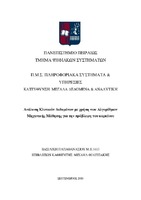Ανάλυση κλινικών δεδομένων με χρήση των αλγορίθμων μηχανικής μάθησης για την πρόβλεψη του καρκίνου

Προβολή/
Λέξεις κλειδιά
Εξόρυξη δεδομένων ; Σύγκριση αλγορίθμων μηχανικής μάθησης ; WBC dataset ; Αλγόριθμοι ταξινόμησης ; Αναγνώριση προτύπων ; Τεχνητά νευρωνικά δίκτυα ; Μπεϋζιανά δίκτυαΠερίληψη
Σύμφωνα με τις στατιστικές, ο καρκίνος αποτελεί τη δεύτερη αιτία θανάτου παγκοσμίως. Παρότι η έγκαιρη ανίχνευση και διάγνωση αποτελούν τα σημαντικότερα βήματα για τη θεραπεία, η πρόγνωση του καρκίνου παραμένει σημαντικότατο βήμα για την αντιμετώπισή του. Η πρόγνωση στην ουσία αποτελεί την πρόβλεψη της πιθανότητας εμφάνισης καρκίνου, την πρόβλεψη υποτροπής των ασθενών και την πρόβλεψη επιβίωσης (προσδόκιμο ζωής). Η εν λόγω πρόβλεψη η οποία μπορεί να βοηθήσει τους θεράποντες ιατρούς στη λήψη αποφάσεων για τους ασθενείς, αποτέλεσε αντικείμενο μελέτης σε πολλές δημοσιευμένες έρευνες τα τελευταία χρόνια. Οι συγγραφείς–ερευνητές επιχείρησαν, χρησιμοποιώντας μεθόδους μηχανικής μάθησης και αλγορίθμους ταξινόμησης, να αναπτύξουν συστήματα και εφαρμογές που θα παράγουν μια πρόβλεψη για την κατάσταση του ασθενούς με ικανοποιητική, συνήθως, ακρίβεια.
Μπορούμε να υποστηρίξουμε πλέον, βασιζόμενοι στις έρευνες και μελέτες των τελευταίων χρόνων ότι η εφαρμογή αλγορίθμων μηχανικής μάθησης αποτελεί πλέον τη νέα πραγματικότητα στις μοντέρνες μεθόδους ανάλυσης δεδομένων. Ο μεγάλος αριθμός μεθόδων αλλά και των παραμέτρων που μπορεί να εφαρμοστούν σε κάθε περίπτωση ανάλυσης κλινικών δεδομένων, επιτρέπει στις μοντέρνες μεθόδους ανάλυσης δεδομένων μεγάλη ευελιξία αλλά ταυτόχρονα οδηγεί τον αναλυτή σε προσεκτικότερη επιλογή αυτών των μεθόδων. Η επιλογή των μεθόδων εξαρτάται από πολλές παραμέτρους, όπως το περιεχόμενο του dataset το οποίο αποτελεί έναν από τους βασικότερους παράγοντες για την εξαγωγή αποτελεσμάτων ακρίβειας.
Στην παρούσα διπλωματική εργασία, πραγματοποιήθηκε συγκριτική μελέτη των μεθόδων μηχανικής μάθησης, με σκοπό την αξιολόγηση των πιο διαδεδομένων και μοντέρνων αλγορίθμων που χρησιμοποιούνται στην εξόρυξη δεδομένων. Η σύγκριση αφορούσε τη λεπτομερή εξέταση προηγούμενων ερευνών με την μετά-ανάλυση και τη μετέπειτα εφαρμογή των αλγορίθμων σε κλινικά δεδομένα με τη βοήθεια του στατιστικού λογισμικού R με σκοπό την πρόγνωση του καρκίνου του μαστού. Τα αποτελέσματα της εφαρμογής ήρθαν σε συμφωνία με αυτά των προηγούμενων ερευνών και επιβεβαίωσαν τη χρήση των αλγορίθμων ανά εξεταζόμενη περίπτωση αλλά και ανάλογα με τον τρόπο μέτρησης της ακρίβειας των μεθόδων. Ανάμεσα στους αλγορίθμους με την υψηλότερη ακρίβεια ήταν οι ΝΝ και ΚΝΝ.

